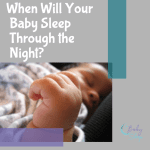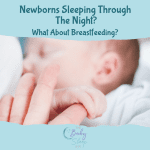
Remember when you were a brand-new parent? You had this precious, beautiful new miracle at home. This precious, beautiful, sleepless little miracle. (Of course, some of you won’t have to think back very far. I may be describing the stage you’re in right now!)
Remember the kinds of advice and “helpful tips” you would get about sleep from well-meaning friends and family members? And how much of that advice centered around the concept of ‘baby sleeping through the night‘? So many of our friends, relatives, co-workers (heck, even strangers in the grocery store!) want to chime in with their two cents about when our babies should be sleeping through the night, how to make babies sleep through the night, and all the ways we’re failing as parents if our babies aren’t sleeping through the night.
However, those of you who have managed to resolve your baby’s nighttime waking or to solve your baby’s nap problems, and who have read up on baby sleep, now have a better context for understanding and evaluating that advice. And you probably realize that, while some of what you heard was true and helpful, other bits of advice you got about sleeping through the night were flat-out wrong.
That’s what we’re taking a look at in today’s article, readers. We are examining the top 5 myths our well-meaning friends and family members tell us about babies sleeping through the night.
5 Myths About Babies Sleeping Through The Night
Before we get into our list, it’s important to define our terms. ‘Sleep through the night’ is actually a bit of a misnomer. Many of us (including pediatricians, authors of baby sleep books, and other baby sleep experts) use the term ‘sleep through the night’ to mean 8-10 (or maybe even 12!) straight hours of sleep, with no wakings. Some say that babies are “sleeping through the night” when they can sleep for a 5-hour stretch without waking. Big difference, right?
We’ve found, over the years, that most parents use the first definition. (Because let’s be honest… A 5-hour stretch of sleep is great, most of us need a little more than that to be functional during the day!) When parents come to us for help with their babies’ sleep, what they want is a solid 8 (or possibly more) hours of uninterrupted sleep. So, for our purposes in this article, we’ll use ‘sleeping through the night’ to mean 8 or more hours of uninterrupted sleep.
Okay… On to the myths!
- “All babies can sleep through the night by 4 months.” The toughest thing about this particular myth is that it’s so prevalent. Lots of pediatricians are still telling this to parents! And some popular baby sleep books (like On Becoming Babywise, for example) still promote the idea that sleeping through the night by 16 weeks is standard.
 Sorry, but in our experience, this just isn’t true. Sure, some babies are ready to sleep for 8/10/12 straight hours by the time they are 4 months old (some do it even earlier – at 8 or 10 weeks), but this certainly isn’t standard for all babies. The truth is, it’s normal for a baby to feed at night up to about 12 months. (Although we usually recommend at least an attempt at weaning from night feeds at 8 or 9 months. Many babies are ready to sleep through the night without feedings by then).
Sorry, but in our experience, this just isn’t true. Sure, some babies are ready to sleep for 8/10/12 straight hours by the time they are 4 months old (some do it even earlier – at 8 or 10 weeks), but this certainly isn’t standard for all babies. The truth is, it’s normal for a baby to feed at night up to about 12 months. (Although we usually recommend at least an attempt at weaning from night feeds at 8 or 9 months. Many babies are ready to sleep through the night without feedings by then).What’s more, this kind of blanket statement fails to account for lots of important factors, like health history, developmental delays, feeding (formula-fed babies may sleep for longer stretches than breastfed babies, for example), family situations, and temperament. Factors like these are what make each baby unique. Factors like these make it impossible for a statement like ‘all babies can…’ to be true!
If we had to pick an average age for sleeping through the night, it would probably be around 7 months. So, by those standards, babies who are sleeping through the night by 4 months are actually doing it early – not ‘on time’.
- “You should keep your baby awake a lot during the day. Then, he would sleep through the night.” No. No, no, no. New parents, if you hear this one from a friend or a family member, politely nod your head, say ‘thanks!’, and then go home and do just the opposite. Because even though it seems to make sense that keeping a baby awake for long stretches during the day would help her sleep better at night, it won’t work this way. Odds are, it will actually make her nighttime sleep even worse!
See, babies become overtired very quickly. And while a small percentage of babies are able to fall asleep on their own quickly and easily, the majority of babies aren’t able to do so. Instead, if they are kept awake too long, they become progressively fussier and crankier, until they are wailing, screaming, flailing mess, and they are downright impossible to soothe and put to sleep. The fact is, well-rested babies tend to fall asleep easier and stay asleep longer than babies who are overtired.
Note that it is okay to wake up your baby from long naps, if you suspect that she is napping too much during the day and not sleeping enough at night. It’s true that babies will shift sleep from naps to nights (and vice versa), so if your baby is sleeping a ton during the day, and hardly at all at night, then do wake her up from her long daytime naps, in an effort to shift some of that sleep back to nights. But don’t totally cut out naps, or keep your baby awake for hours on end — that’s when things will start to spiral out of control.
- “Your baby isn’t sleeping through the night yet? It’s probably because you’re breastfeeding.” Ah, yes, the “helpful tip” that makes breastfeeding moms everywhere want to tear their hair out! While it’s true that we’ve made great strides over the past decades in understanding the benefits of breastfeeding, and in dispelling lots of breastfeeding myths, for some reason, this one remains.
That’s probably because it’s technically true that breastfed babies do need to eat slightly more often than formula-fed babies. Formula takes longer for babies’ tummies to digest, while breastmilk digests fairly quickly/ Thus, breastfed babies may need to eat more often, and may get hungry faster, than formula-fed babies.
However, this does not mean that formula-fed babies automatically sleep better than breastfed babies. Our Helpdesk alone disproves that theory. We work with plenty of formula-feeding families whose babies won’t sleep through the night or take reasonable naps! What’s more, a breastfed baby CAN learn to fall asleep independently and sleep well at night. Yes, it is possible to breastfeed while sleep coaching. And it can be done successfully!
- “If you start feeding your baby solids, she’ll start sleeping through the night.” I heard this one from many of the older women in my community, back when my eldest was a newborn. And I’ve learned over the years that, back in my grandmother’s era, this was actually seen as a medical fact. Back then, many women were encouraged to start their babies on solid foods as early as 6-8 weeks!
Now, though, any health professional worth his or her credentials will tell you that this is absolutely untrue. For one thing, there’s no connection between feeding a baby solid foods and having him sleep through the night. For another, loads of recent medical research indicates that starting a baby on solid food too early is actually detrimental to the baby’s health. New AAP recommendations make it clear that parents shouldn’t offer solids to a baby who’s under 4 months. What’s more, it’s considered best to delay solids until baby is around 6 months.
- “Your baby still isn’t sleeping through the night?? MY baby started sleeping through the night when she was 4 minutes old!” Okay, yes. I’m exaggerating here. I doubt there’s any mom out there who would actually claim her baby was sleeping through the night just minutes after birth. But some parents have pretty grand claims about when their babies started sleeping through the night. And while some of those claims are actually true (some 8 week old babies really do sleep 8 straight hours all by themselves), they aren’t always.
For one thing, a parent who makes a claim like this may be using a different definition of ‘sleeping through the night’ then you are (see above). Of course, they might also be outright lying about it. It’s true, readers! Parents lie about baby sleep. I’m not making this up. It’s a documented fact! There’s a study to prove it!
That study revealed that an estimated 1/3 of parents actually lie about their babies’ sleep, in an effort to seem like better, more perfect parents. And about 1/5 of those parents who lie claimed that their babies and toddlers were sleeping through the night, when, in fact, they weren’t at all.
So, the next time someone smugly tells you that her baby was sleeping through the night FROM THE MOMENT OF BIRTH (or something like that), remember this study. There’s a chance it could be true. If so, good for her! There’s also a chance that her version of ‘sleeping through the night’ is different than yours. And finally, there’s a fair chance she might be stretching the truth a little.
But here’s the bottom line, moms and dads. Who cares? You are the parent of your baby, not anyone else. Who gets to decide what is good and healthy and right for your baby? You do! Not others. You get to decide when your baby’s sleep habits actually become a problem, and when it’s time to take action.

 Sorry, but in our experience, this just isn’t true. Sure, some babies are ready to sleep for 8/10/12 straight hours by the time they are 4 months old (some do it even earlier – at 8 or 10 weeks), but this certainly isn’t standard for all babies. The truth is,
Sorry, but in our experience, this just isn’t true. Sure, some babies are ready to sleep for 8/10/12 straight hours by the time they are 4 months old (some do it even earlier – at 8 or 10 weeks), but this certainly isn’t standard for all babies. The truth is, 






